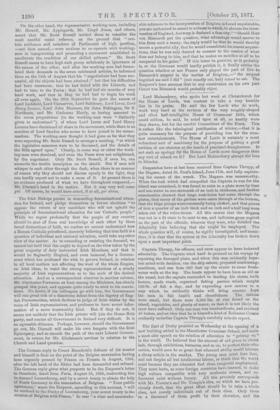On the other hand, the representative working-men, iucluding Mr. Howell,
Mr. Applegarth, Mr. Lloyd Jones, and others, assert that Mr. Scott Russell invited them to consider the most needful social reforms, on the ground that " cer- tain noblemen and members of Parliament of high position, —not then named,—were anxious to co-operate with working- men in inaugurating and promoting a movement established to ameliorate the condition of our skilled artizans." Mr. Scott Russell seems to have kept each group sedulously in ignorance of the names of the other, and after the working men had formu- lated their demands in the seven celebrated articles, he informed them on the 19th of August that his "negotiations had been sue- ceesful, all the objects had been attained ;" but that his difficulties bad been enormous; that be had failed with the Liberals, and had to turn to the Tories ; that be had had six months of very hard work, and that in May ho had had to begin his work all over again. On the 28th September he gave the names of Lord Lichfield, Lord Carnarvon, Lord Salisbury, Lord Lorne, Lord Henry Lennox, Lord John Manners, Sir John Pakington, Sir S. Northcote, and Mr. Gathorne Hardy, as having assented to the seven propositions (so the working-men were " distinctly given to understand "), of whom Lord Lorne and Lord Henry Lennox have disclaimed all share in the movement, while there is no mention of Lord Sandon who seems to have joined in the memo- randum. The working-men thought it had gone so far that they were expecting Mr. Scott Russell to arrange a meeting, "at which the legislative measures were to be discussed, and the details of the Bills agreed upon." Clearly, in some way or other the work- ing-men were deceived, and even the Peers were not enlightened, by the negotiator. Only Mr. Scott Burnell, if even he, can reconcile the double inscription on the shield. But if men will whisper to each other through the dark, when there is no manner of reason why they should not discuss openly in the light, they can hardly expect not to make a mess of it. At present there is no evidence produced of what we have throughout suspected,— Mr. Disraeli's hand in the matter. But it may very well come yet. Of course, he would have acted, if at all, per alium.


































 Previous page
Previous page